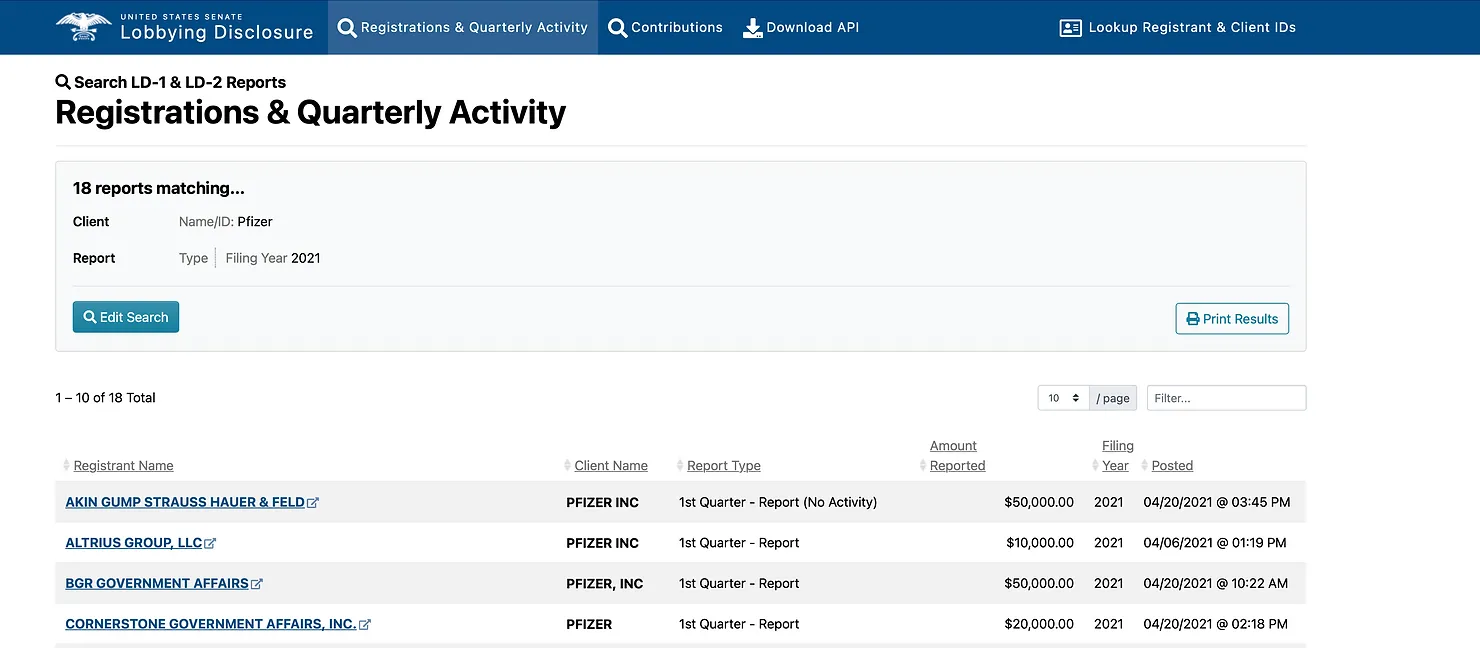TRIPS Waiver proposal in Geneva mobilizes lobbyists in capitals around the world
Feeling the heat, Big Pharma has been using its financial clout to push back and engage in a frantic lobbying effort to influence governments not to join the project, documents from the US Senate and other organizations show.
Should patents be waived for vaccines and treatment until the pandemic is under control around the globe? Initiated and led by South Africa and India, and embraced by civil society, the proposed measure is becoming one of the fiercest debates around COVID-19 and has led to an unprecedented mobilization on both sides of the battle lines.
Feeling the heat, Big Pharma has been using its financial clout to push back and engage in a frantic lobbying effort to influence governments not to join the project, documents from the US Senate and other organizations show.
Mandatory disclosure forms reveal that starting in the first quarter of this year, dozens of law firms and individuals have rushed to register as lobbyists, specifically stating that their work is directly linked to the TRIPS’s waiver currently discussed at the WHO in Geneva.
In addition to the Senate’s disclosures, data from the US Chamber of Commerce show over US$17 million spent in recent lobbying filed under “World Trade Organization pending proposal related to COVID-19 and intellectual property rights.” AstraZeneca has reinforced its army of lobbyists, spending US$870,000 on issues related to “COVID-19 vaccines.” So did Pfizer for “issues involving international trade, including IP protections.”

Different associations of manufacturers also list “patent issues” as the main focus of their lobbying effort. A single such association has registered 12 different lobbyists in Washington, DC. Another form also shows individuals working on “Trade Related Aspects of Intellectual Property Rights (TRIPS) Waiver.”
Meanwhile, pressure is growing from lawmakers and institutions in order to promote a change in the US position regarding the waiver. Last week, Senator Bernie Sanders, chairman of the powerful Senate Budget Committee appealed to Biden's stated willingness to rebuild US credibility around the world. “On this enormously important health issue, this moral issue, the United States has got to do the right thing,” he said.
In the UK, two dozen British lawmakers requested the government publish all communications, emails, phone messages and documents between Boris Johnson’s Cabinet and pharmaceutical companies to see if private lobbying influenced the opposition of the UK’s government to the waiver at the WTO.
In the EU, nearly 400 Members of the European Parliament and of national parliaments signed a joint appeal expressing their support for the waiver.
Documents obtained by the Corporate Europe Observatory, a research and campaign group based in Brussels, through a freedom of information (FOI) request, show the extent of Big Pharma PR effort towards the European Commission. According to the group, the European Federation of Pharmaceutical Industries and Associations (EFPIA) spent €5.5 million in 2020 with 25 lobbyists on payroll in Brussels. One year before the pandemic hit the continent, they had spent €4.6 million.
The documents reveal how, on 9 December 2020, the EFPIA lobbied trade representatives from the European Commission. In its opposition to the waiver, the EFPIA “presented the landscape of collaborations that the vaccine developers as well as those working on COVID-19 treatments engage in to increase the manufacturing capacity and the overall supply of vaccines and treatments,” arguing that ramping up production rather than waiving IP was the key to addressing the problem.
During the meeting, “1100 potential treatments and vaccines” were listed by the EFPIA lobbyists who argued that the industry had the “capacity to address the pandemic. The obstacle was not patents, but ‘country preparedness’ and ‘timely regulatory approvals,’” they said, reflecting the standard industry position. They also committed to “engage in manufacturing agreements, which may include technology transfer, process with carefully selected licensees or contract manufacturers.”
A document presented to the UE also claimed that the South African and Indian proposal “represents an extreme measure for an unidentified problem.” Patents, on the other hand, were an “enabling force” for the developing of vaccines and of the cooperation between companies and governments. Four months later, in a speech at the WTO on 10 March 2021, the EU called for a “much closer, more integrated and more strategic public/private cooperation with the industry.”
“Transfer of the required know-how technology is also necessary and for that purpose, intellectual property is a key factor in providing a framework that enables this cooperation. We should focus our efforts on the cooperation with pharmaceutical companies, in order to ensure that they enter into license agreements with companies around the world that have the necessary production capacities and can export the vaccines to any lower income countries without production.”
For the EFPIA lobby group, the alternative to assure a wider distribution would be to put all energy—and money—into COVAX. “COVAX is the only viable way,” it claimed.
On Monday, 26 April—World IP Day—the pharmaceutical industry organization INTERPAT released 10 “IP principles for Advancing Cures and Therapies,” a document arguing that a strong IP system advances public health.
The waiver is also opposed by the Bill and Melinda Gates Foundation, one of the major global health players.
-JC
